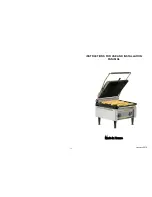
40
Troubl
eshooting
SPIDER AND INSECT WARNING
WHEN TO LOOK FOR SPIDERS
1.
The smell of gas in conjunction with the burner flames
appearing yellow.
2.
The grill does not reach temperature.
3.
The grill heats unevenly.
4.
The burners make popping noises.
BEFORE CALLING FOR SERVICE
COOKING TEMPERATURES
PROBLEM
SOLUTION
When attempting to light my grill, it will
not light immediately.
Make sure you have a spark while you are trying to light the burner
Check to see if the other burners operate. If so. Check the gas orifice on the
malfunctioning burner for an obstruction.
Regulator makes noise.
Vent hose on the regulator may be plugged or regulator may be faulty. Ensure
the vent hole on the regulator is not obstructed. Clear the hole, close the gas
control valves. Wait ten minutes and re -start.
Check your flames for proper performance. If the flames are not correct,
replace regulator.
Full size cover does not fit the grill.
Cover may be incorrect for your grill. It may be a tight fit.
Ensure the cover is the correct length for your grill.
Compare the location and size of the hood portion of the cover to your grill.
Spread the cover and allow it to relax, preferably in warm sunlight or in a warm
room.
For grill with a side shelf bunch the cover like a sock, put on left to right.
Checking and cleaning burner/ venturi tubes for insects and insect
nests. A clogged tube can lead to a fire beneath the grill. Although
an obstructed burner tube is not the only cause of “FLASH-BACK”,
it is the most common cause.
To reduce the chance of “FLASH-BACK”, you must clean the
burner tubes before assembling your grill, and at least once a
month in late summer or early fall when spiders are most active.
Also perform this burner tube cleaning procedure if your grill has
not been used for an extended period of time.
High setting - Use this setting for fast warm-up, for searing steaks
and chops, and grilling.
Low setting - Use this setting for all roasting, baking, and when
cooking very lean cuts such as fish.
These temperatures vary with the outside temperature and the
amount of wind.
Cooking with in - direct Heat: You can cook poultry and large cuts
of meat slowly to perfection on one side of the grill by indirect
heat from the burner on the other side. Heat from the lit burner
circulates gently throughout the grill, cooking the meat or poultry
without any direct flame touching it. This method greatly reduces
flare-ups when cooking extra fatty cuts, because there is no direct
flame to light the fats and juices that drip down during cooking.
CAUTION: If burners go out during operation, close gas supply at
source, and turn all gas valves off. Open lid and wait five minutes
before attempting to relight (this allows accumulated gas fumes
to clear).
CAUTION: Should a grease fire occur, close gas supply at source,
turn off all burners and leave lid closed until fire is out.
CAUTION: Do not attempt to disconnect any gas fitting while your
grill is in operation. As with all appliances, proper care and main-
tenance will keep them in top operating condition and prolong
their life. Your gill is no exception.
You should inspect the burners at least once a year or immedi-
ately after any of the following conditions occur:
If the grill does not function properly, use the following check list
before contacting your dealer for service. You may save the cost
of a service call.
PREHEATING:
The grill lid should be in a closed position during
the preheat time period. It is necessary to preheat the grill before
cooking certain foods, depending on the type of food and the
cooking temperature. Food that requires a high cooking tempera-
ture needs a pre-heat period of five minutes; food that requires a
lower cooking temperature needs only a period of two to three
minutes.



































